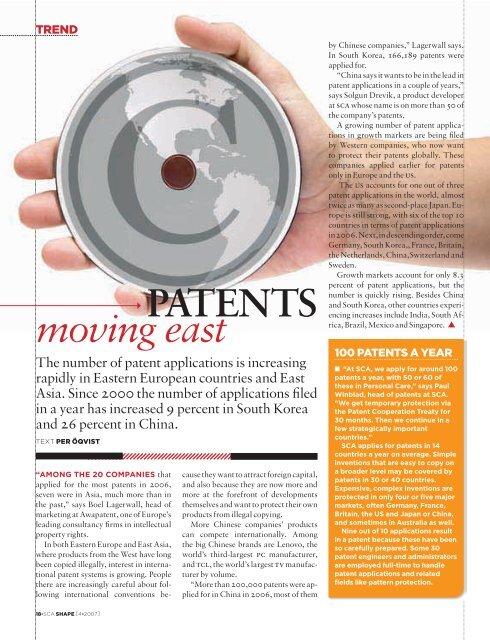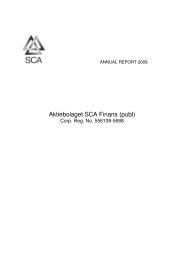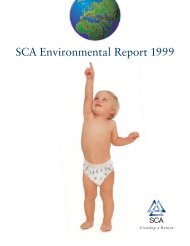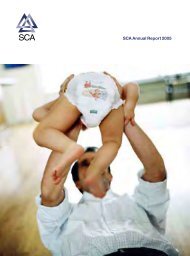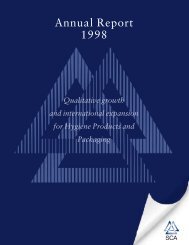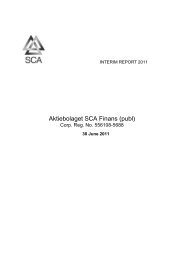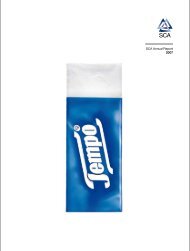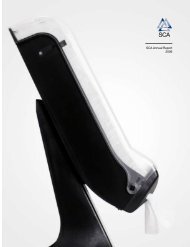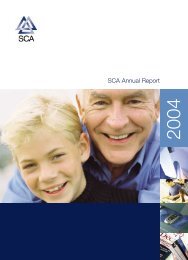SHAPE SHAPE SHAPE
SHAPE SHAPE SHAPE
SHAPE SHAPE SHAPE
Create successful ePaper yourself
Turn your PDF publications into a flip-book with our unique Google optimized e-Paper software.
TREND<br />
PATENTS<br />
moving east<br />
The number of patent applications is increasing<br />
rapidly in Eastern European countries and East<br />
Asia. Since 2000 the number of applications fi led<br />
in a year has increased 9 percent in South Korea<br />
and 26 percent in China.<br />
TEXT PER ÖQVIST<br />
“AMONG THE 20 COMPANIES that<br />
applied for the most patents in 2006,<br />
seven were in Asia, much more than in<br />
the past,” says Boel Lagerwall, head of<br />
marketing at Awapatent, one of Europe’s<br />
leading consultancy fi rms in intellectual<br />
property rights.<br />
In both Eastern Europe and East Asia,<br />
where products from the West have long<br />
been copied illegally, interest in international<br />
patent systems is growing. People<br />
there are increasingly careful about following<br />
international conventions be-<br />
18*SCA <strong>SHAPE</strong> [4*2007]<br />
cause they want to attract foreign capital,<br />
and also because they are now more and<br />
more at the forefront of developments<br />
themselves and want to protect their own<br />
products from illegal copying.<br />
More Chinese companies’ products<br />
can compete internationally. Among<br />
the big Chinese brands are Lenovo, the<br />
world’s third-largest pc manufacturer,<br />
and tcl, the world’s largest tv manufacturer<br />
by volume.<br />
“More than 200,000 patents were applied<br />
for in China in 2006, most of them<br />
by Chinese companies,” Lagerwall says.<br />
In South Korea, 166,189 patents were<br />
applied for.<br />
“China says it wants to be in the lead in<br />
patent applications in a couple of years,”<br />
says Solgun Drevik, a product developer<br />
at sca whose name is on more than 50 of<br />
the company’s patents.<br />
A growing number of patent applications<br />
in growth markets are being fi led<br />
by Western companies, who now want<br />
to protect their patents globally. These<br />
companies applied earlier for patents<br />
only in Europe and the us.<br />
The us accounts for one out of three<br />
patent applications in the world, almost<br />
twice as many as second-place Japan. Europe<br />
is still strong, with six of the top 10<br />
countries in terms of patent applications<br />
in 2006. Next, in descending order, come<br />
Germany, South Korea,, France, Britain,<br />
the Netherlands, China,Switzerland and<br />
Sweden.<br />
Growth markets account for only 8.3<br />
percent of patent applications, but the<br />
number is quickly rising. Besides China<br />
and South Korea, other countries experiencing<br />
increases include India, South Africa,<br />
Brazil, Mexico and Singapore. ▲<br />
100 PATENTS A YEAR<br />
■ “At SCA, we apply for around 100<br />
patents a year, with 50 or 60 of<br />
these in Personal Care,” says Paul<br />
Winblad, head of patents at SCA.<br />
“We get temporary protection via<br />
the Patent Cooperation Treaty for<br />
30 months. Then we continue in a<br />
few strategically important<br />
countries.”<br />
SCA applies for patents in 14<br />
countries a year on average. Simple<br />
inventions that are easy to copy on<br />
a broader level may be covered by<br />
patents in 30 or 40 countries.<br />
Expensive, complex inventions are<br />
protected in only four or fi ve major<br />
markets, often Germany, France,<br />
Britain, the US and Japan or China,<br />
and sometimes in Australia as well.<br />
Nine out of 10 applications result<br />
in a patent because these have been<br />
so carefully prepared. Some 30<br />
patent engineers and administrators<br />
are employed full-time to handle<br />
patent applications and related<br />
fi elds like pattern protection.


